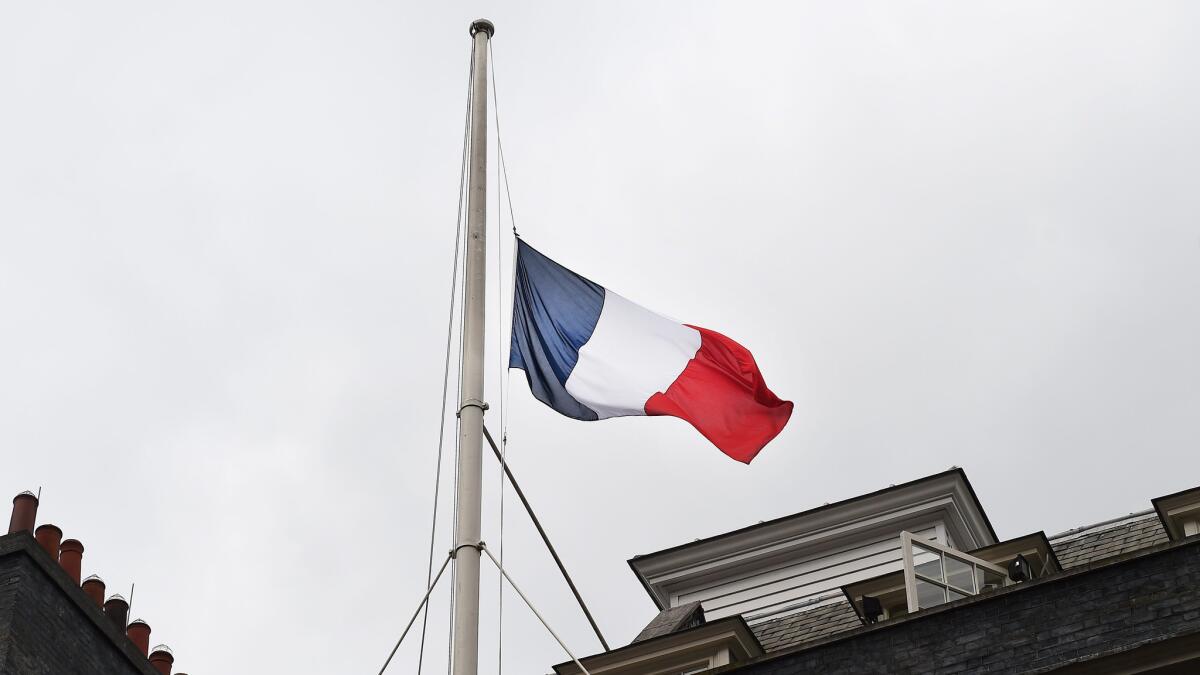Op-Ed: A father worries about a daughter in France

- Share via
The older of my two daughters has lived in France for well over two decades. She lived in Paris most of those years, and she didn’t drive a car, sparing a fretful father half a world away the most common of parental concerns — about traffic accidents on busy highways. I’d also spent enough time with her strolling the streets at night to know that Paris was less fraught with the threat of violence, freer of the sense of menace than American cities and even small towns, where we’ve learned to fear gun violence. I worried less about my daughter in France than I did about my younger child who lived in Los Angeles, drove the freeways and lived in a neighborhood I considered rather dicey.
Those relatively calm decades ended when the offices of Charlie Hebdo were attacked in January 2015. As it happened, my daughter was visiting us here in California when that atrocity took place, packing her bags to return home on the day we learned of those dead editors and cartoonists. It brought the terror close, made it more immediate, made her seem more imperiled as she went about her business in Paris.
But people adjust to fears, accommodate anxiety and proceed with their lives because there really is no alternative. And so, the very next day, we drove to the airport, hugged her, waved as she disappeared among the throngs undergoing the now familiar ritual of airport security.
Communication between France and California is so much easier and affordable than it was when she first became an ex-pat. Once back on French soil, my daughter reported back to us about the heightened security at Charles de Gaulle airport and on the streets. She felt and relayed the increased sense of apprehension that accompanied every passenger on the Metro, or hung over the gabble of conversation in the cafes.
Some 11 months later, my “French” daughter was again on a holiday visit to the States when the terror attack took place at the Bataclan, a nightclub in Paris where she had spent many nights enjoying musical offerings from around the world. As we watched piecemeal accounts of the horror on television, she was receiving text messages from friends, some of whom had been there. A young woman she knew was among the dead. That, of course, eliminated any remaining confidence I might have clung to about my daughter’s relative safety in her adopted land.
She no longer lives in Paris. She lives about 15 minutes from Omaha Beach, where so many Americans gave their lives some seven decades ago when France and the entire civilized world was even more imperiled by insanity than it is now.
And this week, both of my daughters were together on Bastille Day. My younger kid was visiting her sister, and the two of them spent most of the day on that D-Day beach, returning home tired. They were asleep when those 80-plus people were dying on the streets of Nice, far to the south. They are sleeping as I wrote these words, unwilling to wake them with a call to bring them the news.
The world is a dangerous place; these are dangerous times. So we all say our little prayers. Even the nonreligious among us send our devout wishes into the cosmos, hoping for the safety of our kids wherever they are on this scary planet. Even in less stormy times, all the world’s parents fret over their children, no matter how far those kids have advanced into adulthood. Many of those mothers and fathers have far more to worry about than I do, but we all know the world rains down peril with random indifference.
My daughters woke up to the bad news from the south of France. We exchanged our lamentations for the dead and damnations against people who can do such monstrous things.
Once, a long time ago, when my girls were adolescents and I was eaten up with fears known to every father of teenage daughters, I asked a woman whose children were grown and out of the nest just when it was I would stop worrying. The older mother laughed at my question. Shaking her head, she replied, “That worry never goes away. Ever.”
Jaime O’Neill is a writer in Northern California.
Follow the Opinion section on Twitter @latimesopinion or Facebook
More to Read
A cure for the common opinion
Get thought-provoking perspectives with our weekly newsletter.
You may occasionally receive promotional content from the Los Angeles Times.










